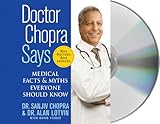Can Coffee Can Be Healthy?
Update: While this article is mainly on the healthy aspects of coffee, there are some downside to coffee which I will mention at the bottom of the article.
Coffee can have many healthy benefits which includes having beneficial antioxidants and flavonoids. Coffee helps regulate insulin and decreases inflammation. It reduces the risk of developing Type 2 diabetes and dementia. And can decrease the risk of cardiovascular diseases and certain types of hormonal related cancers.
Although more of a drink rather than food, EatingWell.com has listed coffee in its article Bad Foods You Should Be Eating where "bad" is not really bad, but more of a bad reputation. But coffee may not be as bad as many people think. The negative is primarily due to its caffeine. And those who can not tolerate the caffeine or who are pregnant should limit coffee.
Many health experts have given the "okay" and "thumbs up" for coffee. The first chapter of the book Dr. Chopra Says:
"coffee may also offer substantial benefits, including protection against heart disease, Type 2 diabetes, liver cirrhosis, Parkinson’s disease, cavities, colon cancer, prostate cancer, and even suicide."
When asked whether exercise or coffee is better, he answers "run to Starbuck" [page 14].
At Starbucks, you should ask for "black house coffee". This is their least expensive and most healthy beverage besides plain water. Don't get the high sugar drinks such as the Latte or Frappuccino. And you should not be adding sugar to your coffee either. If coffee is too strong for you, you can add some milk provided that you do not have casein allergy and is not troubled with lactose intolerance.
Sugar is terrible for health and if you add that to your coffee, it will make coffee a less healthy beverage.
Studies on Coffee
The Beverage Guidance Panel consisting of six researchers was tasked to determine what are the best healthy beverages to drink. The answer they concluded is water followed by tea and coffee.[1]
Articles on Harvard School of Public Health says that "Up to three or four cups of coffee or tea a day appear to be fine."[1]
and that ...
"evidence is good that for people in general—outside of a few populations, such as pregnant women, or people who have trouble controlling their blood pressure or blood sugar—coffee is one of the good, healthy beverage choices."[2]
Coffee May Reduce Risk of Type 2 Diabetes
There is something in coffee (and it is not the caffeine) that helps reduce the risk of developing type 2 diabetes. Coffee contains minerals such as magnesium and chromium which increases insulin sensitivity making it easier for your body to move glucose into it's cells.
Several studies have indicated this ...
- Study have found that moderate coffee consumption (either caffeinated or decaffeinated) may lower risk of type 2 diabetes in young and middle-age women.[reference]
- WebMd says "Every Cup of Coffee Per Day Lowers Risk of Type 2 Diabetes by 7%" [reference]
- ScienceDaily reports of UCLA study that found an inverse relationship between coffee consumption and risk of type 2 diabetes. That is more coffee is associated with lower risk of diabetes. [reference]
For diabetics however, the caffeine in coffee may increase blood sugar and make it more difficult to control glucose levels. See article why Coffee Reduces Risk of Developing Type 2 Diabetes, but bad for Diabetics.
Coffee Decreases Risk of CardioVascular Diseases
Since diabetes is a risk factor for cardiovascular disease and stroke, it makes sense that coffee decreases these risk factors since it decreases risk of diabetes.
A study of 130,000 people found that coffee drinkers (of 1 to 3 cups per day) are 20% less likely to be hospitalized for arrhythmias than nondrinkers.[3] Note however, that if you have serious heart arrhythmia condition, coffee can be dangerous with that condition.[reference book: Dr. Chopra Says]
Study of Japanese men and women found that caffeine consumption from coffee, green tea, black tea, and oolong tea consumption is associated with lower mortality rates due to cardiovascular disease.[5]
Coffee Reduce Risk of Dementia
Studies are showing that coffee drinkers have less risk of developing dementia, Parkinson's disease, and Alzheimer's disease. In these cases, the effect is probably due to the caffeine. Coffee is also strong antioxidant, and antioxidants may help with reducing risk of dementia.
A study of 1,400 people in Finland and Sweden followed for about 20 years found that serious coffee drinkers (3-5 cups a day) were 65% less likely to develop dementia and Alzheimer’s disease.[3]
CBS News reports of two mice studies that indicates coffee may lower Alzheimer's risk possibly due to reducing inflammation in the brain.
The two studies can be found in Journal of Alzheimer's Disease (Volume 17, Number 3, July 2009) titled ...
- Caffeine Reverses Cognitive Impairment and Decreases Brain Amyloid-Beta levels in Aged Alzheimer's Disease Mice.
- Caffeine Suppresses Amyloid-β Levels in Plasma and Brain of Alzheimer’s Disease Transgenic Mice
Coffee is Protective Against Certain Cancers
Coffee consumption is associated with a decrease risk of liver cancer and liver cirrhosis. A study shows coffee consumption associated with decrease risk of endometrial cancer (cancer of the lining of the uterus) possibly due to coffee's effect of lowering estrogen and insulin hormones.
Study found lower rates of breast cancer among woman who are coffee drinker. Coffee not only benefits woman. A study of men who drinks 6 or more cups of coffee a day is found to be associated with 20% lower rates of prostate cancer.[4]
Some negatives of coffee
Although a Harvard study consisting of 130,000 volunteers found that coffee does not have any serious negative health effects for healthy population,[2] coffee is not without its drawbacks.
The main problem with coffee is its caffeine, which needs to be detoxified by the liver and can hamper healthful sleep.
Coffee contains caffeine and which have been implicated with increase risk of miscarriage and lower-weight babies. Hence pregnant women should avoid caffeine intake. People with serious cardiac arrhythmias should also avoid. For diabetics, coffee may make increase blood sugar.
Coffee may increase blood pressure and worsen heartburn and irritable bowel syndrome. For some people, it may keep them up at night or increase frequency of urination.
References:
- [1] Healthy Beverage Guidelines - Healthy Drinks
Healthy Beverage Guidelines - Healthy Drinks - The Nutrition Source - Harvard School of Public Health - [2] Ask the Expert: Coffee and Health - Your Nutrition Questions Answered
Ask the Expert: Coffee and Health - Your Nutrition Questions Answered - The Nutrition Source - Harvard School of Public Health - [3] Health Benefits of Coffee - WebMD
WebMD discusses the health benefits of coffee and possible risks for those with certain conditions. - [4] Coffee and Cancer Risk? - Dr. Weil
- [5] Coffee, green tea, black tea and oolong tea consumption and risk of mortality ...









